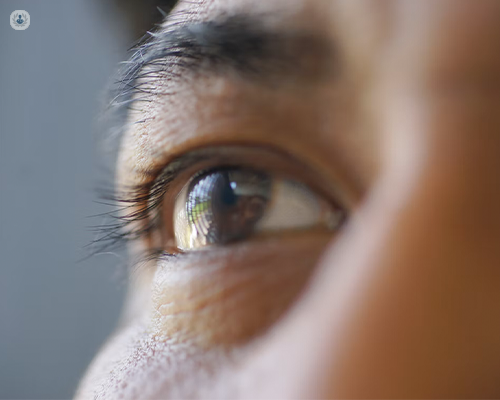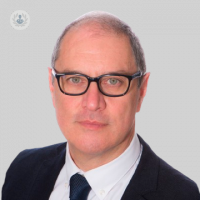What are the risks associated with cataract surgery?
Written by:Here, extremely well-regarded and experienced consultant ophthalmologist, Mr Sergio Pagliarini, discusses in expert detail all the key frequently-asked questions about cataract surgery.

What is cataract surgery?
Cataract surgery is the surgery by which a cloudy lens is removed and replaced with a clean, plastic lens. It is the most common surgery performed in the UK and worldwide. It is not a complication-free surgery, but the associated complications are very minimal and rare.
What are the benefits of cataract surgery?
When a cloudy lens builds up (cataract), the light entering the eye becomes slightly blocked, which leads to blurry vision. Also, people with cataracts suffer from intense glare especially when driving at night against oncoming traffic. Removing this cloudy, blurry lens will benefit patients when going about their daily activities, and driving at night will become less of a challenge.
What are the risks associated with cataract surgery?
The risks are during the surgery and after the surgery. Sometimes, the little tissue that supports the new lens might break. This is not the end of the world, and the cataract surgery will need to be performed over a longer amount of time in order to correct this.
Occasionally, a second surgical procedure may be required if the original cataract surgery didn’t go as planned. Even when the surgery is performed perfectly, some patients may still respond negatively, and this depends entirely on individual response to cataract surgery.
About one in 10 patients might experience similar symptoms of cataracts some time after undergoing cataract surgery. If this happens, a quick, safe outpatient procedure will be performed. This is called a YAG laser capsulotomy.
How do I prepare for cataract surgery?
One thing that is hugely important to assess is the ocular surface. If this is healthy, recovery after cataract surgery is quicker. Patients suffering from underlying dry eye should seek treatment, and use eye drops if necessary.
What is the recovery process like following cataract surgery?
Vision tends to be better from day one, but it might take a few days for the vision to improve. In most cases, within a week, patients’ vision will be pretty much in the best possible state. There will also be a need for the slightest of changes in patients’ spectacle prescription.
What are the long-terms risks and benefits of cataract surgery?
There are not really many long-term risks. Rather, there are more short-term risks immediately after the surgery or during the surgery. Patients who are very, very short-sighted have an increased risk of retinal detachment (somewhere between the first six to 12 months after any eye surgery).
To schedule in an appointment with Mr Sergio Pagliarini, simply head on over to his Top Doctors profile today.


